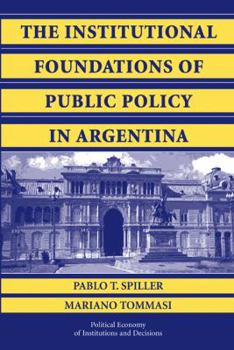The Institutional Foundations of Public Policy in Argentina
Select Format
Select Condition 
Book Overview
The authors have two purposes in this book, and they succeed admirably at both. They develop a general model of public policy making focused on the difficulties of securing intertemporal exchanges among politicians. They combine the tools of game theory with Williamson's transaction cost theory, North's institutional arguments, and contract theory to provide a general theory of public policy making in a comparative political economy setting. They...
Format:Paperback
Language:English
ISBN:0521145783
ISBN13:9780521145787
Release Date:July 2009
Publisher:Cambridge University Press
Length:254 Pages
Weight:0.75 lbs.
Dimensions:0.7" x 5.9" x 8.9"
Customer Reviews
0 rating





